India is one of 36 countries where it is not a crime to rape your wife. Well, if your wife is younger than 15, then even the law says intercourse with her is rape. But that is the only exception.
Now, even this exception is under judicial scrutiny as a two-judge bench of Justices C Hari Shankar and Rajiv Shakdher of the Delhi High Court begins hearing from two individuals and two NGOs, RIT and the All India Democratic Women’s Association. It is also hearing from an amicus curie, or friend of the court, Rajshekhar Rao and has asked another senior advocate, Rebecca John to weigh in.
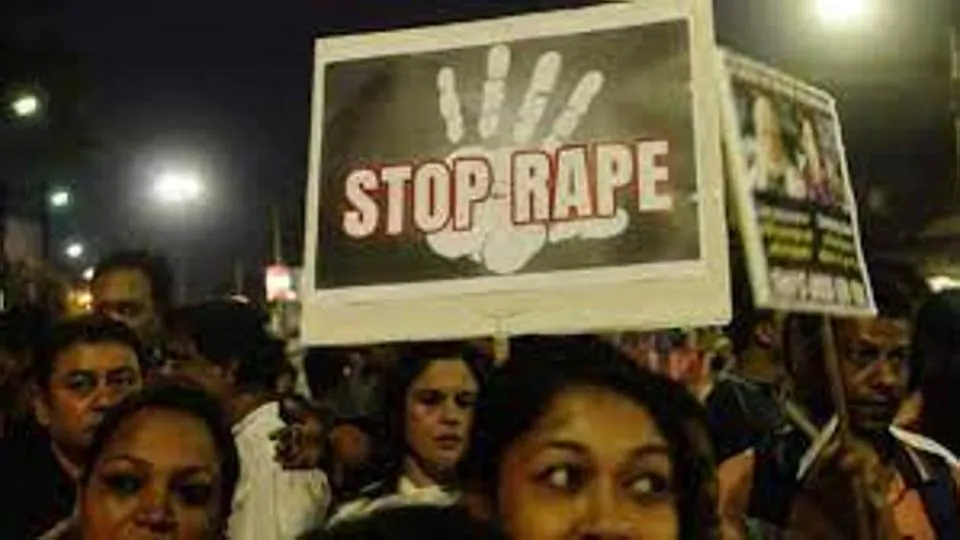
In December 2021, the Gujarat High Court also agreed to consider the constitutional validity to the marital rape exception and issued notice to attorney general K.K. Venugopal, the state of Gujarat and additional solicitor general Devyang Vyas. The matter is scheduled for hearing on January 19.
Legal precedent
Parliament ignored the Justice J.S. Verma Commission’s recommendation to criminalise marital rape.
But different courts have weighed in differently over the issue. In August 2021, the Kerala High Court ruled that marital rape is a valid ground for divorce. That same month, a sessions court in Maharashtra granted anticipatory bail to a man on the grounds that forcible sex with his wife was not illegal, even though it had left her paralysed. Also in August, the Chhattisgarh High Court acquitted a man charged with marital rape but upheld charges against him filed for unnatural sex under section 377.
In 2017, the Supreme court noted “sexual intercourse with a girl below 18 years of age is rape regardless of whether she is married or not” (Independent Thought v Union of India). Some legal scholars have interpreted this to mean that the rape of a minor wife would not be exempt from criminal sanction.
Crux of the issue
At the heart of the matter is the exception in rape law that does not criminalise forcible sex with a wife–unless she’s younger than 15. The Delhi government, represented by additional standing counsel Nandita Rao, concedes that marital rape is a “crime of cruelty” but argues that wives already have remedies under different sections of existing law, including divorce on the grounds of cruelty, the filing of a criminal case under section 498-A (cruelty by a husband or his relatives) and protections under the domestic violence act that include sexual abuse.
“The covenant of marriage is a promise of mental, physical, financial and sexual companionship,” her written submission before the court states. “Willingness is presumed between spouses.”
Opposing side counsel argues that marital rape violates a woman’s right to dignity, personal and sexual autonomy guaranteed to her by the Constitution. “Harm is not dependant on being married or not,” advocate Karuna Nundy argued.
Supporting the striking down of the exception, Rajshekhar Rao emphasised that rape dehumanises women. “A woman is better off, as a matter of law, when she is assaulted by a stranger. But when her loved one assaults her, the law says she is not entitled to call that act rape,” he told the court. “A rape is a rape and a rapist remains a rapist,” he said.
Prevalence of marital rape
National Crime Records Bureau data tell us 98% of rapes are committed by persons known to survivors. Since marital rape is not an offence, no separate data is maintained about its prevalence but we know from the December 2020 round of the National Family Health Survey that in seven states, more than a quarter of the women surveyed said they had been subjected to domestic violence, including sexual violence. A 2013 United Nations survey found that one in four men in six countries surveyed, including India, said they had raped a partner.
The central government has opposed the criminalisation of marital rape, saying that doing so will destabilise the institution of marriage and become an easy tool for harassing husbands. On January 13, it modified its stand, saying it was considering a “constructive approach” and has sought suggestions from all stakeholders, including state governments in order to make comprehensive rather than “piecemeal” amendments.
The Constitution guarantees equal protection of laws and autonomy to all citizens. Does the exception in rape law discriminate against married women? Certainly, the idea that married women are somehow lesser citizens goes against the grain of a modern democracy.
The idea that a wife ‘belongs’ to her husband and that by marrying him, she grants him absolute and irrevocable rights to her body is well past its sell-by date.
The Delhi High Court has reiterated a wife’s right to sexual autonomy. But, it also acknowledged that the crime of rape covered by section 375 of the Indian Penal Code is “very very wide” where even a single instance of unwilling sex can land a man in jail for 10 years. “The court can’t ignore what happens when we knock it [marital rape exception] off,” Justice Shankar said.
Court hearings will continue in the coming week.
GOING PLACES
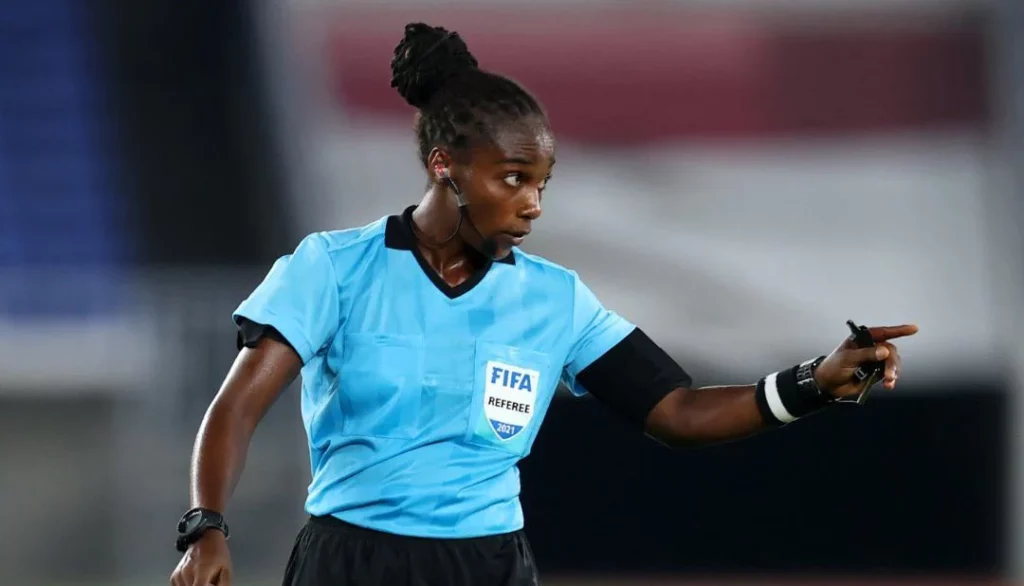
Salima Mukansanga has made history as the first woman ever to referee at the African Cup of Nations (Afcon). The 33-year-old from Rwanda has already officiated at major tournaments and games but this year’s Afcon will be her first major men’s tournament. She is one of four women on the list, but the only referee.
Gender Tracker
Only 29% of Indian women play any sport, compared to 42% of men. A March 2021 survey by BBC found 37% of respondents said female athletes are not feminine enough.
(Source: BBC)
Quote/Unquote
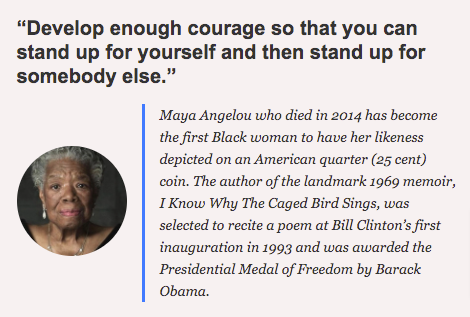
REST IN POWER
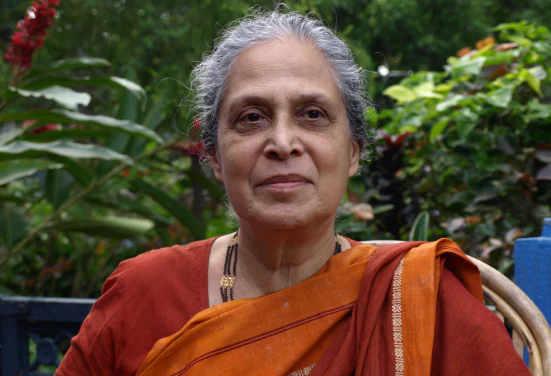
Maria Aurora Couto, writer, memoirist and a critic committed to Goa’s transcultural traditions, has died after a brief illness. The author of Goa—A Daughter’s Story examined the personal life through social history, something she repeated in Filomena’s Journeys, a tribute to her mother that revealed the portrait of a marriage, family and culture. The critic Ranjit Hoskote called Goa—A Daughter’s Story a “meditation on the persistences and lacunae of collective memory and also a compelling account of the development of a private self through the momentous passage from colonialism to the post-colonial period.”
The former English Literature professor helped start the DD Kosambi Festival of Ideas and had been involved in activities of Goa University.
WATCH

The Taliban’s takeover of Afghanistan on August 15, 2021 has accelerated the country’s human rights crisis. Women’s rights have been rolled back as secondary schools for girls remain closed and women are largely prohibited from working in jobs outside of teaching and healthcare, leaving Afghans “caught between Taliban oppression and the spectre of starvation,” says Human Rights Watch.
Meanwhile, the Ministry for the Propagation of Virtue and the Prevention of Vice ordered a series of mannequin beheadings in the western Afghan province of Herat. In Kabul, Taliban authorities increased monitoring of public taxis to ensure that only women in head scarves accompanied by a male relative are allowed to ride distances of over 72 km. Watch video.
STORIES YOU MIGHT HAVE MISSED
Bishop acquitted of rape
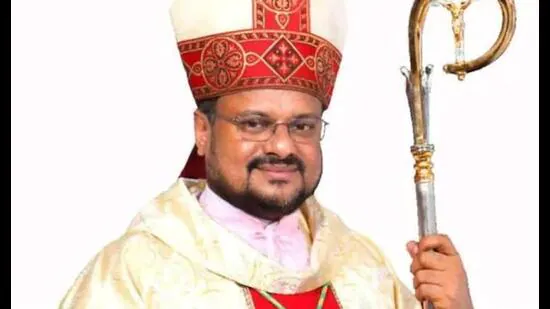
Additional sessions judge at Kottayam, G Gopakumar acquitted Franco Mullakal, former bishop of the Jalandhar diocese, of all charges of raping a nun. The reason for acquittal was lack of evidence, reports Ramesh Babu.
Trial of the case began in November 2019 after a rape case against the bishop was registered by police. In her police complaint, registered in 2018 after a complaint to the church in 2017 was ignored, the nun accused Mullakal of raping her 13 times between 2014 and 2016.
The survivor nun has stood by her charges in a case that saw several twists and turns. She has had the steadfast support of five other nuns who started a Save Our Sisters movement.
Superintendent of police, S Harishankar said he was disappointed with the court verdict and would appeal. “There are enough corroborative and circumstantial evidences,” he said. Sister Anupama, one of the nuns who have stood by the complainant said “We are ready to die to uphold our cause.”
Lad Sakti Hoon
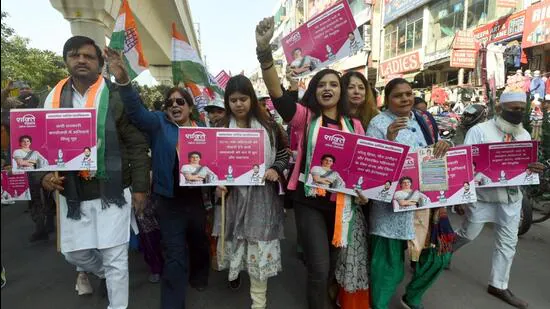
The mother of the Unnao rape victim, a block official who was assaulted during a panchayat election, an ASHA worker agitating for an increase in wages, and an anti-CAA activist are among the 50 women candidates of the Congress party’s 125 named so far for the UP assembly polls, reports Umesh Raghuvanshi. Keeping her promise to field 40% women candidates, Congress general secretary Priyanka Gandhi Vadra said “Efforts have been made to field candidates who have been struggling and fighting for a cause and can bring about a new way of politics.”
Siddharth’s ‘rude joke’ backfires
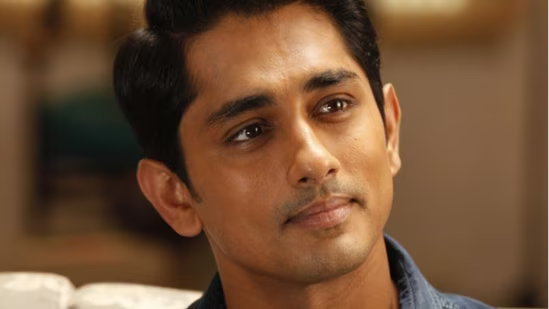
Following social media outrage over a sexualised and objectionable tweet, actor Siddharth apologised to badminton player and Olympic bronze medalist Saina Nehwal for his “rude joke”. Apology notwithstanding, the actor faces criminal charges filed against him in Hyderabad. The National Commission for Women has also asked Twitter India to block his account.
Muslims under the scanner in MP’s love jihad law

In Bhopal, Shruti Tomar reports on how right-wing groups are emboldened and cases registered almost exclusively against accused who are eiher Muslim or Christian in the one year since Madhya Pradesh enacted its ‘love jihad’ law or the Freedom of Religion act. Of the 65 cases registered, 56 fall under the rubric of ‘love jihad’, and of the 107 people booked, 78 are Muslim and 29 Christian.
FIELD NOTES
When gender, caste of a doctor matters
Caste-related prejudices worsen when patients prefer male doctors over female doctors, finds a recent paper published in Ideas for India. Based on a field experiment in Uttar Pradesh, the article by Asad Islam, Liang Choon Wang and Yves Zenou of Monash University with Debayan Pakrashi and Soubhagya Sahoo of IIT, Kanpur found that the intersections of gender and caste exacerbate gender disparities among professionals.
Educational quotas were introduced for OBCs (other backward castes) in 2006. Caste-based quotas—7.5% for STs, 15% for SCs, and 27% for OBCs in government-funded institutions—have resulted in an increasing number of marginalised caste students in various medical science programmes.
In the experiment, patients were asked to rank doctors they wished to receive treatment from based on gender, experience and caste. Women doctors with high experience (eight years or more) received a lower rank than men doctors with the same experience. But regardless of experience, upper caste doctors were preferred over lower caste doctors.
Read the paper here.
AROUND THE WORLD
Backlash in Egypt
With a blue head scarf and dressed in black from top to toe, Aya Youssef can be seen dancing to traditional music while on a day cruise of the Nile. Somebody secretly filmed a video and posted it on YouTube, sparking outrage amongst conservatives, leading her husband to divorce her and her removal from her post as teacher.
The treatment of Youssef has also sparked a backlash with women’s rights advocates describing the events as a “witch hunt”. Nihad Abu Qumsan of the Egyptian Centre for Women’s Rights offered Youssef a job but the Education Directorate has since reinstated her as an Arabic teacher. “People bullied and insulted me. I lost my job, my husband, my home, and my mother got sick. My family was impacted by what happened,” Youssef said.
Andrew, the man formerly known as prince
Days after a New York judge ruled that Andrew, Queen Elizabeth’s second son, will face a civil case in the US over allegations that he sexually assaulted a woman in 2001 she was 17, his mother stripped him off all military titles and royal patronages. The woman has claimed that she was a victim of a sex trafficking ring run by late billionaire financier Jeffrey Epstein and was sent out to powerful men, including Andrew, by him. Andrew’s legal team has called her a “money-hungry sex kitten”.
That’s it for this week. If you have a tip or information on gender-related developments that you would like to share, write to me at: namita.bhandare@gmail.com.
Were you forwarded this email? Did you stumble upon it online? Sign up here.
Written by Namita Bhandare. Produced by Nirmalya Dutta.



